Christmas Island's Bread and Butter: Fish
Part Two of a Two-Part Series
Focusing on Christmas Island
As I reached for my pack,
and was looking around, onto the counter the grilled
tuna came, lightly browned...
The Fish-Restaurant's proprietor
greeted us through the service window above the counter
that leads back into his kitchen. But only his blue and
green apron was visible as he maneuvered between grill
and counter and back, seasoning the tuna and laying out
silverware and soy sauce bottles. It wasn't until I
pushed open the kitchen door that I was able to see his
dark and grinning face.
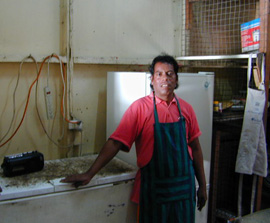 There
is no printed or posted menu, just a few covered tables
and ashtrays. When the lone chef finishes a dish, it
appears in the window. Upon our mid-afternoon arrival, a
couple of customers were taking their grilled tuna and
rice to their seats. Nicholas called into the back for
two orders of the same, apparently the only option.
While we waited, I got my lighter ready and stood in the
entrance, taking a good long look outside at London.
There
is no printed or posted menu, just a few covered tables
and ashtrays. When the lone chef finishes a dish, it
appears in the window. Upon our mid-afternoon arrival, a
couple of customers were taking their grilled tuna and
rice to their seats. Nicholas called into the back for
two orders of the same, apparently the only option.
While we waited, I got my lighter ready and stood in the
entrance, taking a good long look outside at London.
London is Christmas Island's largest
village. It serves as the economic and social center of
the entire atoll. Small material supply companies,
household goods stores, two restaurants, a gas station,
an ice cream shop, a few government offices, and a motor
pool convene around a few dusty, but paved, roads near
the wharf at the lagoon's entrance.
Though the I-Kiribati (Kiribati people)
survive mainly through subsistence agriculture means,
the export of fish, salt, seaweed, and coconut products
gives the local economy a little international flavor.
Tourism too, generated by bone fisherman from the U.S.,
also adds to the coffers, though without the flavor.
I turned around to the sound of two
plates hitting enamel.
The tuna comes on a full plate with
rice and vegetables, all smothered in a light gravy
sauce and all for two Australian bucks. We found a spot
near the entrance. I put my pack on the table for later.
"These bone fisherman,"
Nicholas said, his mouth full of rice and sauce,
"they're really pieces of work. They come in here
with their poplin shirts, khaki pants, waders,
fly-decorated vests, panama hats, and custom fly rod
setups. Sure they help out the island by employing
fishing guides and whatnot, but I don't think they
really see much of this atoll beyond the tips of their
rods during the day or the rims of their whiskey glasses
at night."
I grinned and thought back to the
morning when Nicholas picked me off the beach while I
was composing a few thoughts. "So did you think I
was a fisherman? Is that why you decided on giving me
the island education?" I scooped a large hunk of
tuna into my mouth.
"Nah, you just looked particularly
pathetic," he said with no hint of sarcasm.
"But as I showed you today with our trip out to the
scientific relics at the southeast end of the island,
there's more to this place than quaffing beer with
dancing girls."
"What dancing girls?" I
demanded, recollecting nothing in the way of dancing at
my hotel the night before. While inching a cigarette
from the pack, I was able to recall, though, the quick
jig a cockroach put on in my toilet before I pressed the
lever. However, I quickly conceded him his reference to
beer and his prior allusion to rims of whiskey glasses.
"Tonight," he said, his plate
now clean, "I'll show you. But first I think you
should develop an appreciation for how important the sea
is to this island."
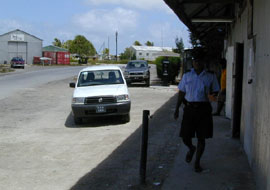 I
polished off the last of my fish and applied lighter to
cigarette. We set the plates on the counter and bid
farewell to our host.
I
polished off the last of my fish and applied lighter to
cigarette. We set the plates on the counter and bid
farewell to our host.
The shark had a narrow face
and a sleek gray belly, that shook when gaffed, all foul
and smelly...
With the bright sun overhead and the
clouds having mostly disappeared, the sun's reflection
off the main thoroughfare's predominantly white powdery
crushed coral landscape provided quite a striking
contrast to the dimly lit restaurant. Along with a few
passing Japanese cars and trucks, a policeman, snappily
dressed in blue shorts, hat, and a nicely pressed shirt,
passed on foot. He was poking his head into each shop,
maintaining order. But other than a broken bicycle chain
or a couple of runaway chickens, there is little that
could ever be out of order in London.
Sprinkled outward from central London
are small individual communities of huts, separated
perhaps by large unused oil tanks, a church, a school, a
park, or even simply a row of coconut trees. Within
these neighborhoods, young children run with livestock
between rain-filled potholes while their mothers
supervise and wash the family's clothes. The fathers,
though, usually have bigger fish to fry.
At the water's edge near the wharf, we
found a family gutting and carving a white tip reef
shark. With small boat and motor resting inside, the
father skillfully sliced the day's catch as his eager
and proud clan stood by.
"The waters around this island
used to be filled with many black tip reef sharks but
the Taiwanese came and fished them all out over the last
20 years or so," Nicholas said, pointing down at a
species still remaining in plentiful amounts.
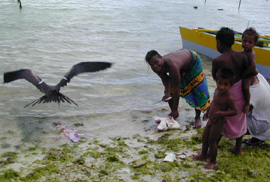 Large
black and white frigate birds, suspended by the oncoming
breeze swooped down, picked at the shark's discarded
entrails in the shallow water. Stringy and bulbous, the
shark's insides proved too difficult for even the
largest bird to haul away at once. With so much activity
nearby, a fast swoop, a quick peck with its long and
thin beak, and an immediate return to the air was the
best any bird could muster, that and a few laughs from
the family's youngest child. Unconcerned with the birds'
plight and too wrapped up in the task at hand, the
carver continued.
Large
black and white frigate birds, suspended by the oncoming
breeze swooped down, picked at the shark's discarded
entrails in the shallow water. Stringy and bulbous, the
shark's insides proved too difficult for even the
largest bird to haul away at once. With so much activity
nearby, a fast swoop, a quick peck with its long and
thin beak, and an immediate return to the air was the
best any bird could muster, that and a few laughs from
the family's youngest child. Unconcerned with the birds'
plight and too wrapped up in the task at hand, the
carver continued.
"You see, most I-Kiribati here
fish with hand lines or nets," Nicholas said.
"They don't see the sport in it. They don't
understand returning a fish to the sea like these bone
fishermen."
After the rows of the shark's teeth had
been removed, the boat was hauled up onto the beach and
its motor stowed. The birds had free reign with what
remained. We kept walking further, down towards the
central section of the lagoon.
She spoke not a word, but
went straight to her work, and laid out all the seaweed;
then turned with a smirk...
Christmas Island is the largest coral
atoll in the world. There is no better place to view its
immensity than from the edge of the lagoon. Here the
water spreads out in varying shades of turquoise, blue,
and green. Near the lagoon's edge, thin fingerlings of
raised land, sometimes occupied with small bushes and
palm trees, extend in varying patterns and orientations
to form small pools and flats. This is the home of the
bonefish.
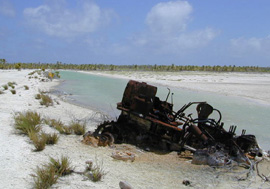 "You
ever felt what it's like to have a bonefish strip 60
feet of line off your reel between the time you've set
the hook and can start reeling?"
"You
ever felt what it's like to have a bonefish strip 60
feet of line off your reel between the time you've set
the hook and can start reeling?"
I thought back to last year when I took
junior reporter Junko to the concrete fishing holes in
front of Ichigaya Station for Secretaries' Day. I shook
my head.
"Those strips of land separating
the flats form a maze of small roads back in
there," Nicholas said, pointing to out over the
blue and green water. "If you don't have a guide
you'll get lost before you have a chance to cast
once."
Through the glare of the sun, I could
see rows of wood stakes protruding up from the sea a few
hundred feet from us. I pointed and asked what they were
for as a man walked between the stakes retrieving a
fishing net.
Nicholas directed me down the beach
back in the direction of the wharf where a woman was
carefully placing brown and green seaweed out on mats
for drying. "This seaweed is for export to Japan
and Germany," he said. "It gets harvested
after growing between the stakes that you saw out
there."
I stood with my pack in my left hand
while small ripples lapped the shore and thought about
what a German would do with seaweed.
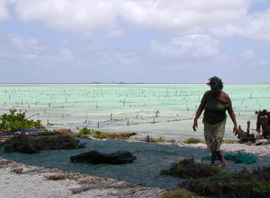 "But
speaking of the fishing guides," Nicholas said,
taking my shoulder and making a turn back for the car,
"tonight you'll meet a lot of them at the
disco."
"But
speaking of the fishing guides," Nicholas said,
taking my shoulder and making a turn back for the car,
"tonight you'll meet a lot of them at the
disco."
I nodded approvingly and lit another
cigarette.
But I heard him say, as he
walked into the night, "I've got a busy year ahead
and must wake at first light."
On a concrete slab behind the Captain
Cook Hotel on Friday and Saturday nights, girls dance
beneath strings of overlapping lights to a blend of
hip-hop and reggae while middle-aged fishing guides
stand around discussing their former days as captains
and deckhands when they cruised the Pacific.
Nicholas and I stood at the bar
enjoying our first drinks, regaled under a clear night
sky of stars by stories not too far-fetched from former
sailors.
"Buenos Aires, heh, heh," Bob
said, his skin deeply darkened from his seven-day a week
work schedule, talking about his days sailing between
North and South America. "Mucho bonita seniorita!"
He added, laughing and poking me in the shoulder. To
that we clinked beer cans.
Captain Moana, the senior fishing
guide, his face like a catchers mitt with gray whiskers,
stumbled over with drink in hand and joined our
conversation.
With the laughs starting, Nicholas made
his way for the exit. I ran over and yelled but he
didn't stop. Over my shoulder I could hear Moana attempt
to recall the Queen Mary from his visit to Los Angeles
in 1972, "What's the name of that ship in Long
Beach Harbor?" The laughs and the beer continued to
flow.
As I stood at the gate, Nicholas just
muttered something about rising early the next day
before disappearing into the darkness. "No, you
can't leave yet, come on back," Bob said, walking
over to me. "Island tradition calls for three beers
for guests, each with a name; te mauri, te
raoi, and ao te tabomoa."
With tradition at hand, I turned rather
quick, though pausing first, to acknowledge St. Nick.

